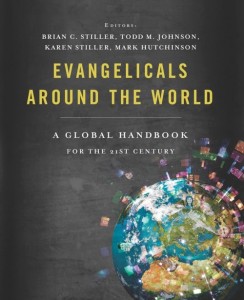It is amazing what a capital letter can do. It was not quite a controversy, but it was quite a hill to climb in the copy-editing stage of the newly released Thomas Nelson book, Evangelicals Around the World: A Global Handbook for the 21st Century. When is Evangelical capitalized, and when is evangelical lower case?
It turns out that the world does not stand in agreement on this issue. The Canadian managing editor finally worked it out with the copy-editors (American), working on chapters submitted from authors (from all around the world, in many different capital usage zones).
Evangelical self-identification

The Big E question does not seem important on its own—it was more annoyance than scandal—but it posed an interesting question of how the evangelical community (lower e as an adjective please!) identifies and views itself as one, large and growing, global community of believers.
How important is it to identify as Evangelical? Why does it matter? What makes a movement or a work or a thought require the adjective evangelical? It was a small grammatical question that hinted at a larger identity issue of a movement that is large and growing, but as far from homogenous as the East is from the West. It is a colorful collective proudly using the term Evangelical, but still working out what exactly that means, and therefore, whom exactly that includes. It is a Gospel people who do not all look alike, sound alike, or even think alike on all things at all times.
A messy church
The book itself is a neat and tidy collection of 51 chapters by 46 contributors, including Rose Dowsett (who was a member of the Lausanne Theology Working Group), in the very relevant chapter ‘The Challenge of Evangelical Diversity’.
Dowsett writes: ‘How inclusive, and how exclusive, should the evangelical family be . . . Is it possible to keep the peace between whose who call themselves conservative Evangelicals, those who call themselves open Evangelicals, those who call themselves Charismatic, those who call themselves Reformed, and those who find most or all of those terms utterly irrelevant and prefer no label at all other than Christian or perhaps Bible-believing Christians?’ An excellent question.
Dowsett concludes: ‘Siblings in a family may be very different from one another, but we recognize that something is badly wrong when they are at war with one another.’ She then calls Evangelicals forward to a life of worship, life, and service.
Lives of service
It is the life of service of Evangelicals that I believe will capture the attention—and admiration—of readers of the book. We were concerned that if we only had chapters like ‘Evangelicals and Politics’, ‘Evangelicals and Missions’, and ‘Evangelicals and Science’, as helpful as those would be, we might be missing the activist and ministry edge of the evangelical community around the world.
So we issued a challenge to a Christian journalist. It was to find the stories of Evangelicals around the world engaged in ministry on the ground, and tell them succinctly in captivating mini-profiles that show the difference Evangelicals make in the communities they call home.
Canadian Debra Fieguth did just that in profiles that range from reconciliation ministry in Israel and Palestine, to an institute for indigenous theological training in North America, to Christian Relief, Assistance, Support and Hope (CRASH), the disaster relief ministry in Japan—and everything in between. The 23 stories Fieguth investigated and wrote demonstrate the breadth of global Evangelicals on the ground, responding to sometimes desperate need in their communities because of the love and commission of Jesus Christ.
In her profile of the India Missions Association, Fieguth shares the revealing story of a mission director who says that when the question, ‘Do you know Jesus?’ is asked, many people replied: ‘He doesn’t live in my village.’
The stories of Evangelicals engaged in ministries of mercy and activism are beautiful proof that Jesus does indeed (and of course) live—and work—in small villages and large cities and down dirt roads and beside paved highways around the world. Amid the book’s more scholarly considerations of the interactions of Evangelicals in areas like urban witness, the arts, presence in mainline denominations, and interaction with other religions, these mini-profiles remind us that ultimately we are a breathing, serving Body living out our high calling of service from day to day in communities from Phnom Penh to Pasadena. Doctrine and belief become service and sacrifice in the stories of these diverse ministries.
What lies ahead?
When our editorial team discussed a chapter on what lies ahead for the evangelical movement around the world, it was immediately clear we had to have a writer from the Global South. Nothing else would do. Any other perspective would be an insult to what is happening in the Global Church today. Paul Joshua Bhakiaraj is a professor at the South Asia Institute of Advanced Christian Studies in Bangalore, India. He wrote the challenging chapter: ‘The Future of the Evangelical Movement’ for the handbook.
It is clear to any observer of the Global Church that if you want find richness and strength in the Church, the Majority World is where you look. If you want action and growth, that is where you find it too.
There, it seems, is where our bright future lies. Bhakiaraj would most definitely agree. He says the time is ripe for ‘a protest and a reformation’, pointing out that the malaise, or crisis, in the Church around the world ‘revolves primarily around Western Evangelicalism’. It is the ‘rare Western scholar who recognizes the vitality of the Evangelical Movement in the Majority World, and rarer still to identify it as an asset to the world church’, he writes in what may be the most provocative chapter in the book.
While hoping that Bhakiaraj is not 100% correct in that assessment of the rarity of Western recognition of strength elsewhere, it is in any event essential for Western ears especially to hear from this Majority World scholar and leader calling the Church to task—and to hope—as well. Even as Bhakiaraj points to crisis, he points to kairos. In crisis, there is opportunity. This could be ‘a kairos moment that affords us opportunities to protest against that which we have allowed to stagnate the faith. And a moment to scripturally and substantially reform ourselves by returning to and rebuilding on the centrality of the gospel of Jesus Christ. The time is ripe to review the integrity of our claim to gospel centeredness, indeed even our Evangelical credentials’, he writes. There is hope and growth and light and life for the Church—and it is global indeed.
‘The Evangelical Movement of the future will be a recognizably global movement, spread predominantly throughout the Southern and Eastern continents’, writes Bhakiaraj. ‘Not necessarily characterized by its Western features and represented by its Western celebrity leaders alone, it will clearly be a world Christianity, a movement that is recognized as a truly global phenomenon. It will become increasingly more globally representative and expressive of the realities of Southern and Eastern continents.’
A representative Evangelical, writes Bhakiaraj, will probably be a ‘Chinese woman engaged in the marketplace, rather than a white Western theologically educated male. The Evangelical Movement may not be centered any longer in Colorado Springs or in London, but will move, if it already has not, equally to Beijing, Lagos, and São Paulo.’ Bhakiaraj defines the nature of the Evangelical Movement as ‘a gospel centered people in multiple and complex contexts. While our contexts will differ and our responses vary, we must never lose sight of the centrality of the gospel itself.’
The author’s experience working on the massive, sprawling project that eventually narrowed and sharpened to become Evangelicals Around the World: A Global Handbook for the 21st Century suggests that Bhakiaraj is correct. For those who call themselves Evangelical everywhere, the gospel is central and the contexts are complex indeed.

